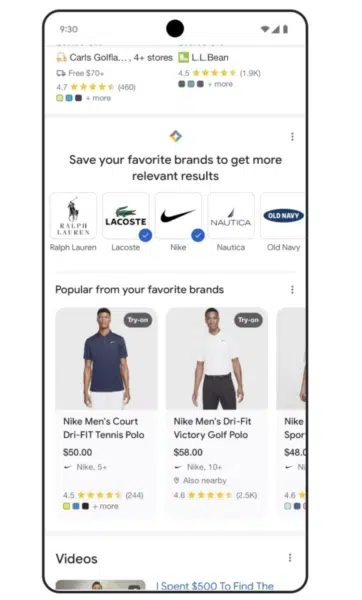Google is piloting new product discovery elements designed to give users a more personalized shopping experience, including:
- Style recommendations.
- Brand preferences.
- Generative AI for product search.
- Virtual try-on technology.
Why we care. These features offer businesses new opportunities to showcase their products and engage with high-value consumers who are likely to be more inclined to make purchases, thanks to a personalized shopping experience tailored to their specific preferences.
Style recommendations. Google is testing Style Recommendations, now accessible to signed-in U.S. shoppers via mobile browsers and the Google app, aiming to deliver more personalized results. For instance, when users search for specific apparel like shoes, they’ll come across the Style Recommendations section. Here, they can offer ratings with thumbs up or thumbs down, or simply swipe right or left to immediately access personalized results.
How it works. If shoppers aren’t satisfied with their personalized results or would prefer to continue browsing, Google offers the option to rate more items and immediately view another set of results. Additionally, the search engine will remember preferences for future searches. For example, when searching for men’s polo shirts again, you’ll receive personalized style recommendations based on your past preferences and interactions with products.
Managing style recommendations. If you’ve rated items incorrectly or would prefer to not see personalized shopping results, you can manage your preferences. To do this, just tap the three dots next to the “Get style recommendations” section and explore personalization options in the “About this result” panel.
Brand preferences. U.S. shoppers searching for apparel, shoes, or accessories on mobile browsers, desktop, or the Google app can now personalize their shopping experience by selecting preferred brands. Once chosen, options from these brands will appear instantly. To manage preferences, tap the three dots next to the “Popular from your favorite brands” section, and access personalization options in the “About this result” panel.


Image generation. Google is piloting an AI image generation tool for shopping, which is now available to all U.S. users who have opted into Search Generative Experience (SGE) within Search Labs. If you’re searching for a specific item, like a “colorful quilted spring jacket,” simply tap “Generate images” after your search to see photorealistic options matching your preferences. Once you find one you like, click on it to explore shoppable options conveniently.
Virtual try on. Additionally, Google is testing a virtual try-on tool in the U.S. on desktop, mobile and the Google app. When you see the “try-on” icon in shopping results, simply click on it, and you can see what the product looks like on a diverse set of real models ranging in size from XXS-4XL.
What Google is saying. Sean Scott, Google’s VP/GM Consumer Shopping, said:
- “People shop on Google more than a billion times a day. And thanks to the Shopping Graph, they see billions of products in their results that are constantly being refreshed. In fact, every hour, more than 2 billion listings are updated with the latest information, including pricing, in-stock availability and shipping details.”
- “So whether you’re looking for a specialty notepad from Japan, a monogrammed handbag from Paris or just a hammer from your local hardware store, the Shopping Graph can help you find it in just a few clicks. With that many options, we’re focused on making it easy to find exactly what you like.”
- “No two shoppers are alike, which is why we’re designing the shopping experience on Google so it’s tailored to you.”
Get the daily newsletter search marketers rely on.
Deep dive. Read Google’s announcement in full for more information.
Contributing authors are invited to create content for Search Engine Land and are chosen for their expertise and contribution to the search community. Our contributors work under the oversight of the editorial staff and contributions are checked for quality and relevance to our readers. The opinions they express are their own.



